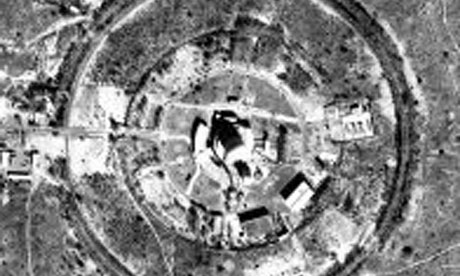
The leaked US cables on the Pakistani nuclear arsenal reveal a serious and growing threat of nuclear terrorism that has been deliberately played down by western governments, counter-proliferation experts said yesterday.
They argued there were political and legal constraints on the assistance the US and others could offer Pakistan to help improve security, and that home-grown safety measures had not kept pace with the rapid growth of the country's nuclear complex and the spread of extremism.
"The intersection of terror and proliferation is nowhere more evident than in Pakistan," said Mark Fitzpatrick, a former US state department non-proliferation official now at the International Institute for Strategic Studies.
"Officials have been talking about this for years," Fitzpatrick said. He argued there were good reasons for the gap between Washington and London's public assurances that the Pakistani arsenal was secure, and the private concerns about the terrorist threat revealed in the WikiLeaks cables.
"The United States has been helping Pakistan make the material more secure, but talking about it doesn't help. It just makes the Pakistanis resist further assistance."
The 1968 Nuclear Non-Proliferation Treaty also places legal limits on the help one country can give another on its nuclear weapons establishment.
Meanwhile, however, there are clear signs that Pakistan is rapidly adding to its estimated stockpile of 90 warheads.
The Institute for Science and International Security (ISIS), an independent thinktank in Washington, published satellite pictures last month which showed construction work on a third heavy water reactor at the Khushab nuclear complex, where plutonium for nuclear warheads is made.
Shaun Gregory, a Bradford University professor who has extensively studied Pakistani nuclear security, said that there were multiple chinks in its armour.
"The military elements of this are fairly robust, but not invulnerable. But on the civilian side, where the fissile material is processed and the weapons produced, levels of safety and security are much lower," he said.
In an assessment of Pakistani nuclear security published last year, Gregory noted terrorist groups had mounted a string of attacks on nuclear weapons facilities, including a nuclear missile storage facility at Sargodha and a nuclear air base at Kamra, both in 2007. In August 2008 Pakistan Taliban suicide bombers blew up several entry points to a nuclear weapons assembly site at Wah.
The army has several concentric layers of security at these sites but Gregory points to other attacks like the assault on the army headquarters itself in Rawalpindi last October – in which the attackers wore army uniforms, drove military vehicles and had detailed maps of the site – as signs of growing sophistication.
"Should terrorists decide to take control of a nuclear weapons site, they are developing the means of doing it. The only thing lacking is a detailed knowledge of where the nuclear weapons are stored."
The gap could be filled by collusion with some of the 130,000 people involved in the Pakistani nuclear arms complex.
"I don't think that in the context of a Pakistani army where there are people disgruntled with what the United States is doing in the region, you can say that collusion can be permanently discounted," Gregory said.
In that context David Albright, the head of ISIS, believes Washington's strategy of keeping quiet about its fears of Pakistan's nuclear security, in the hope of greater co-operation, is not working.
"I've been told for years that the problem was worse than what has been told publicly," Albright said. "But what is surprising is that the United States doesn't have more leverage. We're not getting enough for our money."
He pointed to the failure of repeated efforts of US officials to retrieve US-supplied high-enriched uranium (HEU) in storage at a Pakistani civilian research reactor. Washington has also been unsuccessful in persuading Islamabad to lift its opposition to a global treaty to stop the production of fissile material.
Pakistan is currently blocking talks on the treaty in Geneva. Albright said: "Hiding the truth can't be the basis for a long-term policy."
No comments:
Post a Comment